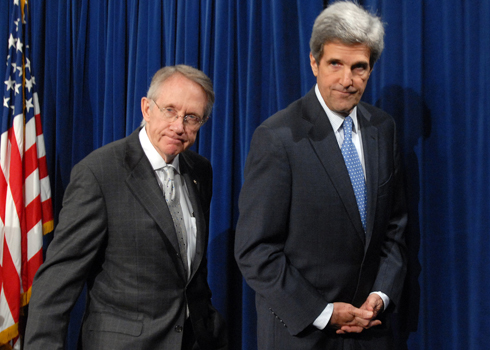Senate Majority Leader Harry Reid (D-NV) isn’t saying why both sides aren’t any closer to a debt deal after a day filled with feverish negotiations Saturday, but Sen. John Kerry (D-MA) spelled it out during a floor speech Saturday night.
The sticking point for Dems, Kerry said, involves detailed negotiations over an enforcement mechanism that would require Congress to act on entitlement and tax reform by a date certain or faces the consequences. Democrats want to ensure that such a trigger does not simply mandate severe spending cuts, but also includes tax increases — the so-called “shared pain” Democrats have cited lately.
“That is the big sticking point here in the Senate,” Kerry said in a floor speech Saturday evening. “We need to know that if there is a trigger that is used in an automatic way in which money is going to be held back, that money has to be held back in a fair and balanced way.”
“You do not just cut, you also have to have the possibility of revenue,” he said. “Because if you do not have the possibility of revenue, then the side that only wants to cut can wait for nothing to happen and the cuts take place automatically. There is no threat to them. There is no leverage for them to come to agreement on the other things.”
So far, the “or else” has focused on a trigger that would slash spending across the board — including for entitlement programs like Medicare, a near-sacred program for Democrats, as well as to defense spending, which Republicans historically have sought to protect. One of the models for the so-called trigger goes back to the Reagan era when, in 1984, Congress passed the Gramm-Rudman-Hollings Balanced Budget Act in 1984, which included a trigger imposing draconian across-the-board spending cuts unless hard-and-fast deficit reduction goals were met.
Back then, during the Cold War anti-communist fervor, Republicans were dead-set against cuts to defense spending so the threat of an across-the-board cut that included slashing defense spending was the equivalent of “shared pain.” Fast forward to 2011, however, and that threat no longer packs the same punch. Tea Party conservatives are eager to draw down U.S. troops in Iraq and Afghanistan and don’t believe that nation-building is helping efforts to combat al-Qaeda or international terrorism.
So Democrats want to ensure real leverage and are demanding that any so-called trigger include revenue raisers.
Another simpler trigger, Democrats say, would simply impose the proposal put forward by Senate Minority Leader Mitch McConnell (R-KY), which would allow the President to raise the debt ceiling with Congress only able to disapprove of the move with a two-thirds majority vote in both chambers. McConnell would have a tough time opposing a plan he suggested such a few short weeks ago, Democrats argue.









